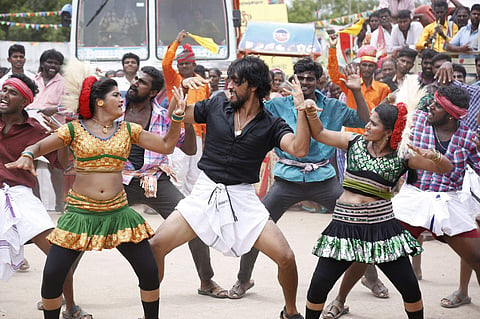Devarattam Review: A violent film whose problems are nullified by its inefficiency
Rating:(2 / 5)
I never thought I’d ever say this in a review of a film, but sometimes, it seems lack of finesse and inventiveness may not be horrible things at all. At least when it concerns films that propagate some dangerous ideas, like Devarattam. It’s ostensibly mounted on Thevar pride, and makes the sort of association with violence we have generally been used to seeing in such films. “Engalukku vettu kuththu venneer vekkara madhiri.” “Engalukku kaththi kuththu, kaadhu kuththu madhiri.” “Thappunu therinja, tappunu adippom.” “Naanga kaavakaara vamsam.” And on and on the dialogues go, flavoured with both community pride and a deep thirst for violence.
Devarattam — and there’s a native dance form named so, even if the film may not necessarily be about it — is a naïve film at best, wilfully dangerous at worst, that believes in the curative power of violence. It mocks democratic forms of protest, with Vetri (Gautham Karthik, who I rather liked in this film), who throws a bottle at a wine shop, suggesting that the only real way to be noticed is through rioting. It cites corruption in our law enforcement and judiciary system as its excuse, and proceeds to unabashedly suggest that violence is the way to go. I, for one, would have been quite intrigued to have this film throw more light on how Katta panchayat plays spoilsport, and how it foils those who seek justice. The film has no such patience or interest in delineating these issues, and simply wants to move on to gratuitous violence.
Director: M. Muthaiah
Cast: Gautham Karthik, Manjima Mohan, Soori, Vinodhini Vaidyanathan
The hero, Vetri, is a lawyer, but you don’t ever see him give it any real shot before resorting to alternative means of delivering justice. According to this film, mere knowledge of a crime (it focusses on those against women) is enough to drive you to maim and kill criminals, because the justice system is apparently broken. It would be all right, I suppose, had Devarattam established Vetri as a flawed protagonist, someone prone to errors in judgment in his search for quick justice. Director Muthiah, however, happily takes his side. At one point, the film even argues that the suppression of his violent instincts could well have caused matters to become worse. In critiquing films, sometimes, we call them outdated. The chief idea of this film is one that belongs squarely in medieval times. It’s a dangerous idea, and that’s why it’s not a bad thing at all that this film isn’t good enough to be compelling.
If as a writer, you really wanted to channel your killer instinct, I’d imagine a good place to start would be to do away with purposeless songs, romantic angles that seem to have some meaning but actually don’t, and misplaced comedy. There’s a comedy scene from Soori (who’s fairly effective) that has the effect of belittling the villain, just before he’s about to do something game-changingly brutal (really liked Vinodhini Vaidyanathan in the scene). The comedy may have succeeded in gaining a laugh or two, but it ruins the emotional impact of the following scene.
Vetri has done something irreversibly dark, and to protect him, his relatives send him to Kodaikanal, along with his girlfriend (Manjima Mohan), of course, so they can make the most of the destination and accommodate a duet. This is supposed to be an intense period in their lives, a brief moment of reflection before the violence in the third act. If we thought it would be a great time for the two to really understand each other, for Vetri’s girlfriend to really make peace with his violent instincts, we are wrong. She’s throwing him smitten looks, and one shot even has them going boating in the hill station, as though they were simply unwinding after a few draining months of corporate work. All of this serves the purpose of ruining any momentum from which to build up on, and even a supposedly shocking twist only ends up being mildly amusing.
If this film had to work at all, it had to be on account of its stunt choreography. But alas, that isn’t particularly inventive either. We continue to see the odd phenomenon of people bouncing off the ground as though they were balloons. Vetri, meanwhile, is invincible; so none of these fights hold any surprise value either. It also doesn’t help that the climax fight is perhaps the most unsurprising and uninventive of all. If you are truly trusting on cathartic violence to do the job, you may as well try and come up with some enterprising ways in which to execute it.
Devarattam ends with some noble posturing concerning women’s safety — you know, of the ‘pengal nam kangal’ variety. In all its self-righteous anger, it suggests that the solution is to brutalise mercilessly (karuvaruththal) the perpetrators of crimes against women. Curiously though, and perhaps most unsurprising of all in such a film, Devarattam tries to create humour out of the supposed ugliness of a woman — one who’s shown to be dark and fat. And that’s when you truly realise that any fury it seems to radiate over the safety of our women is mere posturing. For the true messages of this film, pay careful attention to its props — its background posters and statues — and of course, its dialogues.

